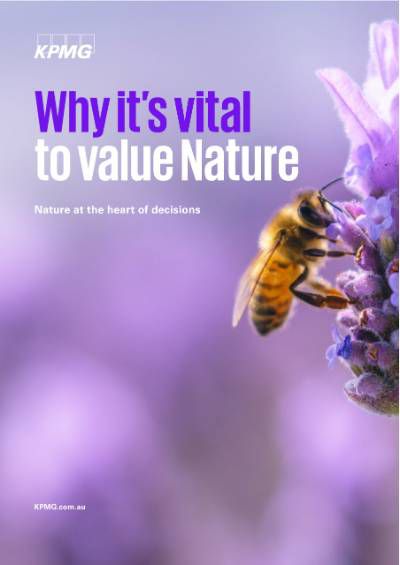Not fully valuing nature in economic decision making is a widespread market failure. This is now generating significant risks to our economy and fundamental way of life. There is a need to tackle this challenge now.
A sustainable economy fundamentally relies on a healthy and valued natural environment. The effects of carbon emissions from human activity on the climate are a daily reminder that degrading the natural environment has real costs for humankind. The increasing prevalence of heat waves, bushfires and floods globally is making the connection between emissions, rising temperatures, and major disruptions to our day-to-day lives crystal clear.
But our impact on the world is not limited to emissions. In almost every part of our lives we interact with the natural environment, and while we’re all generally aware that human activity changes the environment, most of the time we don’t consider the full cost of these interactions to ourselves.
In economic parlance, this failure to consider the full costs of an activity is called market failure. But it has very practical, real world effects. For example, the bleaching of the Great Barrier Reef and the resulting loss of its unique ecosystems has a direct, negative impact on us – the reef protects local communities from storms and erosion and is a direct generator of 1,000s of jobs in the tourism sector. If we do nothing to stop the bleaching, these human benefits will ultimately be lost.
Fully recognising the value of these nature-based services is therefore vital. KPMG acknowledges that Federal and state governments are taking steps in this direction, with the Federal government a key partner of the Taskforce on Nature-related Financial Disclosures (of which KPMG is also a member). We also acknowledge the steps taken by the Australian Bureau of Statistics and other organisations towards estimating the economic contribution of the services the natural environment provides.
KPMG recommends that the government place nature at the heart of its wellbeing budget, with protecting the environment made a key goal (as it is in New Zealand’s Wellbeing budget, first launched in 2019). With this designation, and in a similar way to gender-responsive budgeting decisions, policies and spending decisions that explicitly support sustaining the natural environment should be given proper recognition and weight.
Furthermore, the government should look to marry its decarbonisation commitments and policy decisions with explicit consideration of the trajectory for the natural environment, to develop a holistic National Nature-Positive Economic Transition Roadmap.
This publication discusses the following areas
- Working for free? Nature as a service provider
- Using regulation to protect the environment
- Nature's role in reducing carbon emissions
- Valuing nature and the services it provides
- Fully accounting for nature in economic well-being
- Putting nature at the heart of economic decision-making




